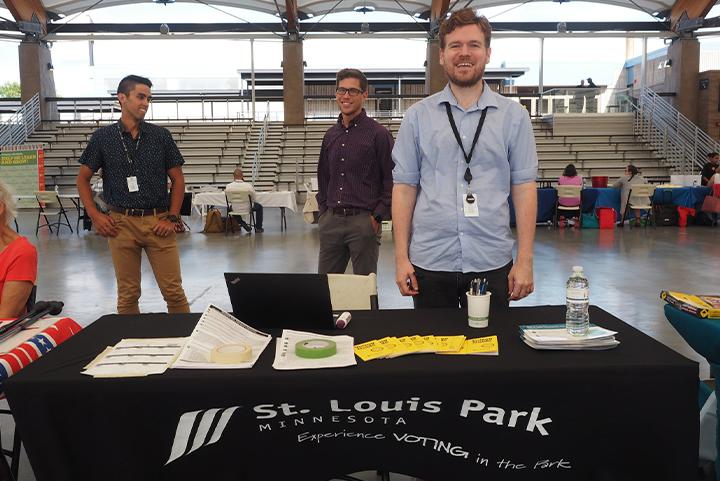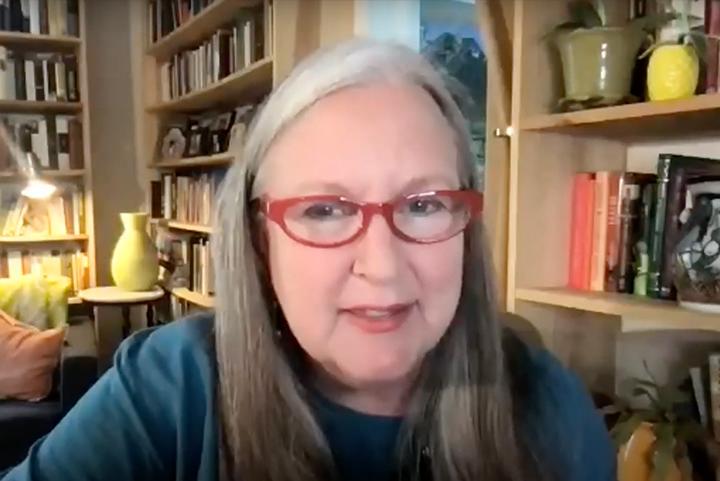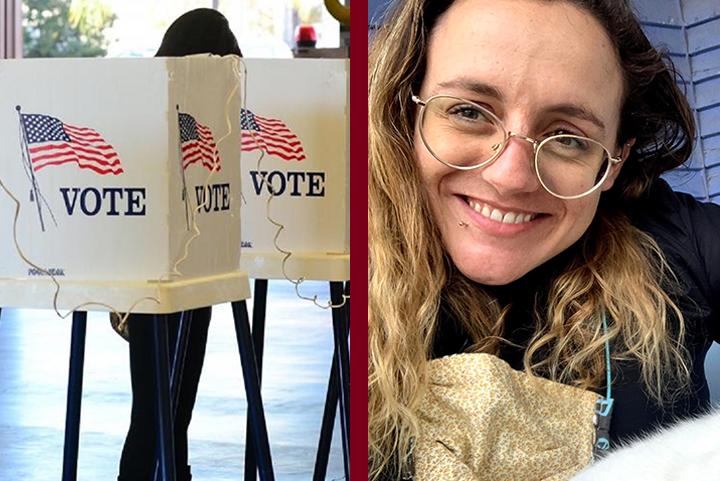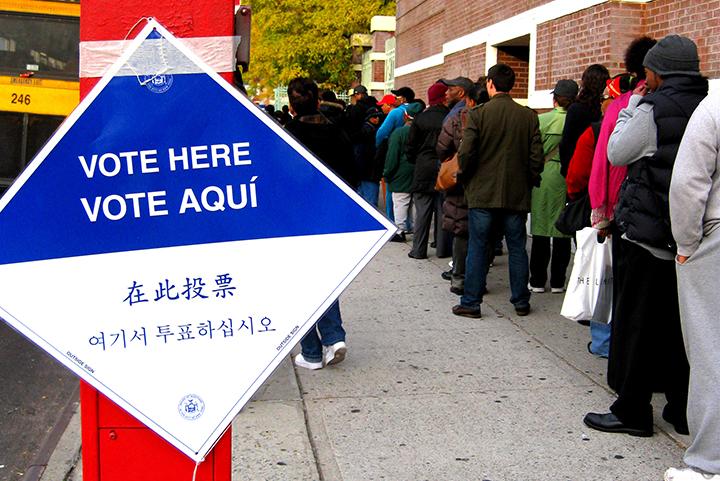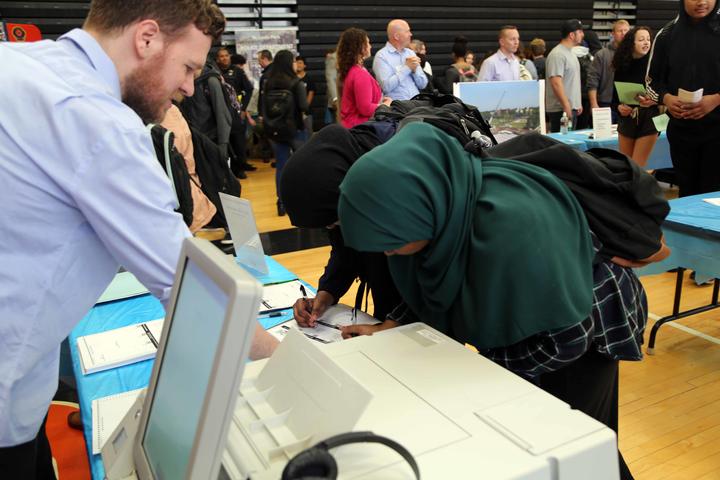America’s election system faces an urgent need for professionals who are well trained in the latest technology and techniques in the field and well-versed in the legal and policy challenges facing our voting system. The Humphrey School of Public Affairs is responding to this widespread need with a pioneering online program to prepare professionals in election administration.
Flexible Online Training
The Certificate in Election Administration is designed with maximum flexibility for those experienced individuals already managing state and local election offices, as well as those seeking to become part of the next generation of creative and committed leaders. Whether you are currently working in or considering a career in elections, this rigorous and relevant online 12-credit program will prepare you for advancement in the profession of election administration. Courses are taught by prominent leaders in election administration and are accessible online 24 hours a day from anywhere in the world.
Meeting a National Need
This first-of-its-kind program in the U.S. is in direct response to the 2014 Presidential Commission on Election Administration report, which urged universities to integrate election administration into their curriculum in a concerted effort to expand professional expertise in the field. The program is presented in an accessible and stimulating online format that allows students to continue with their current employment while working toward a University certificate.
What You Will Gain
- Knowledge of the laws, technology, and debates shaping elections today
- Ability to respond effectively to the rapidly changing landscape of elections
- Career-enhancing connections to peers and leaders in the election field
- Academic credential from the Humphrey School of Public Affairs, one of the country's top professional public policy schools.
Certificate Options
- Post-baccalaureate (bachelor’s degree required)
- Undergraduate (no bachelor’s degree required; one year of work experience in election administration or related field or 45 college credits)
View Certificate in Election Administration application requirements
Webinars
The CEA program hosts a regular series of free webinars for the election administration community. Topics range from poll worker training to election security issues and are hosted by top experts in the field. Watch recordings of the webinars at the links below and view our full playlist.
February 21, 2024: Voting in Jail: Developing a Program to Help Eligible Incarcerated Americans
With Maysa Sitar and Scott Sussman, Moderated by Judd Choate
December 13, 2023: Artificial Intelligence and Elections
With Michael Moser, Moderated by Judd Choate
October 11, 2023: Rural Election Administration
With Cameron Wimpy and Will McLean, moderated by Judd Choate
August 16, 2023: Should U.S. Election Administration be Nonpartisan?
With Rebecca Green, Moderated by Judd Choate
June 7, 2023: Buffeted By Many Storms: The Local Election Official Experience from 2018-2022
With Paul Gronke and Paul Manson, moderated by Judd Choate
April 19, 2023: Creating a Culture of Continuous Election Auditing
With Jennifer Morrell, moderated by Judd Choate
February 8, 2023: Obstacles at Every Turn: Overcoming Barriers to Native American Voting
With Jacqueline De León, moderated by Judd Choate.
Dec. 15, 2022: Dealing with Election Disinformation on the Front Lines
With Karen Brinson Bell and Nate Blumenthal, moderated by Judd Choate
Oct. 19, 2022: Mail Ballot Rejection Policies: Mitigating the Problem of Rejected Ballots
with Marc Meredith, moderated by Judd Choate
August 19, 2022: Addressing Insider Threats and Protecting Election Officials: Colorado's Example
with Judd Choate
April 22, 2022: Election Accuracy: Going on the Offensive Conference
Conference hosted by the Certificate in Election Administration
March 17, 2022: Cybersecurity and Election Integrity
with David Maeda, Chris Piper, and Kim Wyman, moderated by Judd Choate
December 15, 2021: The Changing Landscape of Election Audits
with Pam Anderson and Robert Giles, moderated by Jennifer Morrell
July 8, 2021: Voter Identity Verification: Balancing Access and Integrity
with Julie Anderson and Paddy McGuire, moderated by Rachel Orey
June 4, 2021: The New Danger in Voting Legislation
with Richard L. Hasen and Michael T. Morely, moderated by Tammy Patrick
February 25, 2021: Voting: What Changed in 2020?
with Ryan Teague Beckwith, Robert Giles, Representative Wendy McKamey, and Wendy Underhill
December 16, 2020: Looking Back to Look Ahead: How 2020 May Guide the Future of Elections
with Keesha Gaskins-Nathan, Mark Goins, Daniel Ivey-Soto, Tammy Patrick, Greg Walker, and Wendy Underhill
October 8, 2020: Front-Line Reports on Voting
with Wendy Underhill, Judd Choate, Joseph Gloria, Ben Hovland, and Tammy Patrick
September 1, 2020: Voting in Person in the 2020 Elections
with Matt Weil, Adrian Fontes, Sherry Poland, and Michael Winn
August 13, 2020: Election Security: Security for Whom?
with Wendy Underhill, Matt Masterson, Jennifer Morrell, and Maurice Turner
July 14, 2020: Voting in the Time of COVID-19: Wisconsin’s Experience
with Meagan Wolfe and Doug Chapin
June 2, 2020: Buy-in, Build on, and Brainstorm: Training and re-training staff and poll workers when your processes are changing
with Amy Wilson
May 28, 2020: Vote-by-Mail: What States Are Doing, What States Should Be Doing
with Prof. Larry Jacobs, Senator Amy Klobuchar, Tammy Patrick, Wendy Underhill and Matthew Weil
May 5, 2020: Scaling Vote-at-Home Processes for Safe & Secure Elections
with Amber McReynolds and Doug Chapin
April 8, 2020: “But we went over that in training!”: How to get your poll workers to remember and retain what you tell them
with Amy Wilson
March 5, 2020: Preparing for 2020: Election and Cybersecurity
with Secretary Steve Simon and Judd Choate
December 12, 2019: The Waiting Game: Understanding Polling Place Lines & Preparing for 2020
with Tammy Patrick and Matthew Weil
October 1, 2019: How Can DHS Help Protect My Election?
with Noah Praetz and Judd Choate
August 29, 2019: A Practical Guide to the EI- ISAC
with Judd Choate, Ben Spear, and Kateri Gill
May 29, 2019: Election Security: Preparing for 2020
with Matthew Masterson, Judd Choate, and Doug Chapin
January 9, 2018: Meet the Experts: A Look Ahead at the Spring 2018 CEA Semester
with Tammy Patrick, Dana Chisnell, Whitney Quesenbery, and Doug Chapin
December 6, 2017: Election 2017: Lessons Learned and a Look Ahead
with Doug Chapin
July 2017: America’s Changing and Embattled Election System
with Doug Chapin
October 26, 2016: The Final Countdown: Politics of the Presidential Race
with Prof. Larry Jacobs and Doug Chapin
July 2016: Election 2016: A View from Inside the Polling Place
with Doug Chapin
Conferences
Advisory Board
An advisory board made up of national experts in the field of elections and experienced election administrators guides the development of new course offerings and provides the program with national outreach and strong connections to the professional election community.Board members include:
Judd Choate, Board Chair and Director of Elections, Colorado Department of State
Natalie Adona, Clerk-Recorder/Registrar of Voters, County of Nevada, California
Blake Evans, Director of Elections, State of Georgia
Darlene Harris, Commissioner, Schenectady County Board of Elections, New York
Amy Hild, Commissioner, Schenectady County Board of Elections, New York
Brianna Lennon, County Clerk, Boone County, Missouri
Nick Lima, Registrar/Director of Elections, City of Cranston, Rhode Island
David Maeda, Director of Elections, State of Minnesota
Matthew Masterson, Director of Information Integrity, Microsoft
Jennifer Morrell, Partner, The Elections Group
Michael Siegrist, Township Clerk, Canton County, Michigan
David Stafford, Supervisor of Elections, Escambia County, Florida
Maurice Turner, Technical Policy Lead, Tik Tok
Lawrence Jacobs, Professor and Director, Center for the Study of Politics and Governance, Humphrey School of Public Affairs, Ex Officio Member
Lea Chittenden, Administrative Director, Certificate in Election Administration,
Humphrey School of Public Affairs, Ex Officio Member
Instructors
Instructors in the CEA program are prominent national experts in the field of elections, bringing an incredible depth of knowledge and real world experience to their classes. Current and past instructors include:
- Doug Chapin, Director - Election Research, Fors Marsh Group
- Dana Chisnell, Acting Executive Director for Customer Experience, U.S. Dept. of Homeland Security
- Judd Choate, Director of Elections, Colorado Department of State
- Lawrence Jacobs, Professor, Humphrey School of Public Affairs, University of Minnesota
- Neal Kelley, Registrar of Voters, Orange County, California (retired)
- Matt Masterson, Director of Information Integrity, Microsoft
- Jennifer Morrell, Partner, The Elections Group
- Astrid Ochoa, Principal & Founder, Ochoa Consulting Partners, LLC
- Tammy Patrick, Chief Executive Officer for Programs, The Election Center
- Whitney Quesenbery, Director and Co-Founder, Center for Civic Design
- Gina Roberts, Voter Education Director, Citizens Clean Elections Commission
- Maurice Turner, Technical Policy Lead, Tik Tok and Cybersecurity Policy Expert
- Amy Wilson, former Training Coordinator, Colorado Secretary of State’s Office
Curriculum
The fully online Certificate in Election Administration requires 12 semester credits, including three core courses and five elective credits.
Core Courses (Required)
PA 3969 / PA 5971 – Survey of Election Administration (3 cr.)
Fall 2023, Fall 2024
Comprehensive course on the general building blocks of election administration from voter registration to recounts. Students will learn how the three levels of government interact to manage different aspects of the election process; recognize the key debates and tensions in election policy; and identify their impacts on election administration.
PA 3972 / PA 5972 – Elections and the Law (2 cr.)
Spring 2024, Spring 2025
A thorough examination of election laws at the federal, state, and local level and how they guide the conduct of elections by officials and voters alike.
PA 3973 / PA 5973 – Strategic Management of Election Administration (2 cr.)
Fall 2023, Fall 2024
Strategic management for election administrators in the political environment. This course covers the distinct phases and hurdles of the policy process and skills for election officials to enact new policy.
Elective Courses (5 or more credits required)
PA 3975 / PA 5975 – Election Design (2 cr.)
Spring 2025
An innovative course on design principles and how they are used in election administration. Through small, weekly assignments, students learn and practice new skills in plain language, design, and usability with real election materials.
PA 3976 / PA 5976 – Voter Outreach and Participation (1 cr.)
Spring 2024, Fall 2024
Why do some voters turnout while others don’t? This course investigates the patterns and history of voter participation and practical steps to increase voter turnout.
PA 3982 / PA 5982 – Data Analysis for Election Administration (2 cr.)
Fall 2023, Spring 2025
This course highlights the importance of evidence-based election administration through the collection and analysis of quantitative data to solve problems and identify opportunities for improvement. Pre-election forecasting for planning purposes as well as post-election auditing of election results are emphasized.
PA 3983 / PA 5983 – Introduction to Election Security (1 cr.)
Summer 2024
This course examines the history of cyberattacks on the United States and the American election system, with special attention to the 2016 election cycle. Students will explore the types of cybersecurity threats that exist and strategies to protect against them.
PA 3984 / PA 5984 – Elections Security: How to Protect America's Elections (2 cr.)
Spring 2024, Spring 2025
This course provides elections professionals with tools and best practices to help protect their election technology, guard against influence efforts, and assure public confidence in election outcomes.
PA 3985 / PA 5985 – Physical Election Security (2 cr.)
Fall 2023, Fall 2024
This course provides a deeper understanding of the current security context and best practices and processes for physically safeguarding elections based on 2016 and 2020. Students learn the difference between physical and cyber threats to U.S. systems; tangible steps to protect election offices and their equipment; the use of audits to ensure the accuracy of elections; the integration of security into vendor relationships; and the connection between physical election security and citizen trust in elections.
Admission criteria and materials
Post-baccalaureate certificate (bachelor’s degree required):
- Resume
- Personal Statement (in 500 words or fewer, double spaced, discuss your educational and professional experiences and goals related to election administration. )
- College transcripts
- TOEFL/IELTS scores (required for most non-native English speakers)
Apply now to the post-baccalaureate certificate
Undergraduate certificate (No bachelor’s degree required. 1 year of work experience in election administration or related field or 45 college credits):
- Resume
- Personal Statement (in 500 words or fewer, double spaced, discuss your educational and professional experiences and goals related to election administration. )
- College transcripts (if applicable)
- TOEFL/IELTS scores (required for most non-native English speakers)
Apply now to the undergraduate certificate
Questions about the application process can be directed to [email protected].
Tuition and Fees
The program cost is based on tuition rate per credit. The full program is 12 credits. All students pay the resident rate, regardless of residency status, because it is an online program.
Undergraduate tuition rate: $557.55 per credit.
Graduate tuition rate: $1,059 per credit.
Academic Records Fee: One time fee assessed to support the development and maintenance of the academic record including official document production.
$150.00 - one time (new degree-seeking and certificate students)
$75.00 - one time (non-degree students)
Humphrey School Collegiate fee (per semester)
$250.00 - All students, 6 or more credits
$125.00 - All students, fewer than 6 credits
If you are a University of Minnesota student currently enrolled in a different degree program and taking CEA courses, please check with your degree program for your tuition rate.
Financial Aid, Group Discount, Scholarships
Group Discount
Students do not need to be enrolled in the same courses or at the same level in order to be eligible for the discount.
4 - 9 students: 20% tuition discount
10+ students: 30% tuition discount
Scholarships
More information to come.
Financial Aid
Credit certificate students are not eligible for federal financial aid.
Questions? Please email [email protected].

